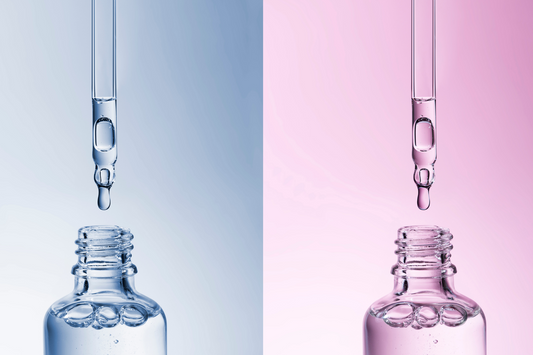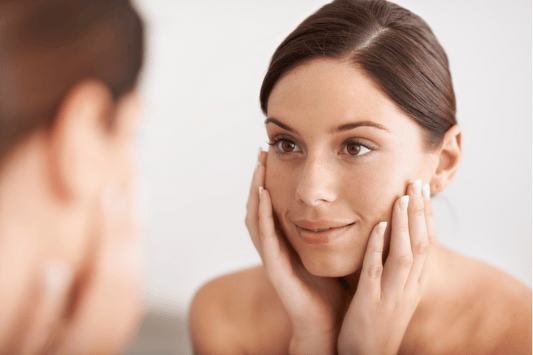When it comes to fresh, modern solutions for restoring your mane to its former glory, social media is saturated with the latest tips and tricks. Many promise results, but do they live up to the hype, let alone stand up to scientific scrutiny?
In late 2021, users on viral social media platforms began promoting the use of rosemary oil as a cheap, natural remedy to prevent hair loss in both men and women, prompting write-ups in no less than Cosmopolitan, BuzzFeed, Elle, and Today. Anyone looking to slather on the latest and greatest remedies might still be a little dubious about the benefits of raiding the neighbor’s herb garden for a few sprigs of rosemary, so we dug into the science to separate fact from fiction.
Trying hair regrowth solutions isn’t just fun and games, and it’s important to get to the root cause of what’s causing your hair loss in the first place. Let’s follow the data!
What Influences Hair Growth?
Biological Factors Impacting Our Hair
There are four primary factors that influence hair growth:
- Dietary and supplemental nutrition - A proper balanced diet is essential for giving your hair the nutrients it needs to grow healthy and strong.
- Signaling hormones - The hormones that make up the endocrine system send instructions all over the body, and the levels of different hormones can both directly and indirectly influence hair growth.
- Blood supply and circulation - Because blood carries nutrients to the scalp and hair follicle, proper blood circulation is essential to provide nutrients and remove waste generated by our growing cells.
- The proportion of growing vs. dormant hair follicles - A sizable majority of our hair follicles are growing in the anagen phase at any given time. However, if the proportion of our hair follicles in the resting telogen phase increases, our hair can both shed more frequently and be replaced more slowly.
Common Treatments For Improving Hair Growth
You might’ve heard of some of the most common medical treatments on the market for thinning hair. Minoxidil—commonly marketed as the brand-name Rogaine—is sold in 2% and 5% solutions and foams, and works to shorten the shedding-prone telogen phase by up to 90% while simultaneously increasing the duration of the grow-y goodness of the anagen phase with daily use. As a vasodilator, or a chemical that enlarges the blood vessels to increase blood flow, minoxidil may improve blood supply to the scalp, as well. In 3-6 months, results may be yours—though you’ll have to continue to apply minoxidil to reap the rewards!
On the other hand, finasteride—branded as Propecia—addresses the hormonal side of the equation. Androgenic alopecia (AGA), commonly known as male-pattern baldness, occurs when the androgen testosterone is broken down into 5α-dihydrotestosterone (DHT), a hormone that shrinks our hair follicles. Testosterone levels tend to increase as we mature before plateauing in our 40s and, as those supplement commercials like to remind us, declining throughout our golden years. Why the chemistry lesson? Well, when it comes to breaking down testosterone into DHT, a special enzyme, 5α-reductase, makes the magic happen—and it just so happens that outside of the male prostate, the scalp produces the highest amount of 5α-reductase in the body! More DHT means more shrinking follicles, and shrinking follicles equal thinner hair.
What Does Science Say About Rosemary Oil For Hair Loss?
We’ve gotten the gist of hair growth, we’ve sifted through some of the common causes of hair loss, and we’ve looked at two of the most common treatments for the most prevalent forms of baldness. How did social media stumble upon rosemary oil at a fraction of the cost? Believe it or not, a handful of studies say they might be onto something.
Rosemary Oil vs Minoxidil: A Comparative Study
The widely-favored study referenced in most write-ups is a 2015 publication from Baqiyatallah University of Medical Sciences in Tehran, Iran on the efficacy of treating hair loss with either rosemary oil or minoxidil 2% solution. In it, 100 Iranian men were randomly assigned a twice-daily treatment of either 1mL of rosemary oil or minoxidil 2% while having photos of their scalps evaluated at intake, at three months out, and at six months out by two separate dermatologists naive to their treatments. Whether or not a particular treatment was effective came down to the average number of counted hairs at each timepoint. Additional information was gathered from self-report survey data given by the trial participants themselves.
How Active Compounds In Rosemary Oil Perform Against Minoxidil And Finasteride
A more interesting 2012 study from Kinki University in Osaka, Japan, however, conducted trials in both control and testosterone-treated mice that compared the effectiveness of rosemary oil for regrowing hair compared to minoxidil 1% and finasteride. Not simply content to sit back and observe, the researchers shaved the backs of ten mouse subjects for each experiment and sought to make two distinct comparisons: How does rosemary oil extract compare to minoxidil 1% solution, and how does rosemary oil extract compare to testosterone-treated mice (i.e. mice predisposed to extra DHT)?
In a smaller experiment in their publication, the researchers identified the active component in rosemary oil as 12-methoxycarnosic acid (12-MCA). Because the accumulation of DHT around the hair follicles causes hair thinning and loss, and because the enzyme responsible for converting testosterone to DHT, 5α-reductase, occurs most frequently in the male prostate, inhibitory assays in human prostate cell lines were conducted to confirm the anti-androgenic efficacy of 12-MCA.
The Verdict On Rosemary Oil For Hair Growth
Is rosemary oil an effective, low-cost solution for treating hair loss? If so, what is the active ingredient, and how does it work? The two experiments we’ve highlighted above investigated the question in different ways. One collected more qualitative data from human subjects, while the other sought to identify the active compound in rosemary oil and compared its efficacy against standard treatments for hair growth.
What Did The Studies Say?
In the randomized comparative trials in humans, the results showed rosemary oil performed comparably to minoxidil 2%. However, given that the trials lacked sufficient controls, lacked direct supplemental data for evaluation by readers, and showed overlapping confidence intervals without clearly labeled tables and figures, both the methodology and reporting seemed less rigorous than desired.
In the experimental trials in mice, though rosemary oil extract did not perform exactly as well as the industry standards minoxidil and finasteride, it performed similarly while yielding statistically significant results when compared to negative controls. Further, inhibitory assays in human prostate cell lines supported the conclusions of the researchers that they had identified the correct compound, 12-MCA, and that it functioned as hypothesized by disrupting the enzymatic activity of 5α-reductase.
Are There Benefits of Rosemary Oil For Hair?
Taken together, the experiments serve as useful starting points for future research. The publication from the Iranian researchers is useful, but should not be seen as definitive for the reasons we discussed above. On the other hand, the Japanese researchers paint a more coherent picture of how effective rosemary oil is for hair growth. The overall results are statistically significant when compared to controls, and additional experiments that attempted to explain the mechanism of action both make sense and bolster the underlying story of the publication.
Should Rosemary Oil Join Your Hair Routine?
Rosemary oil appears to represent a promising alternative for hair growth, though further research is certainly warranted before a definitive conclusion can be drawn. It seems that researchers are narrowing in on the precise mechanism of action, but other compounds in rosemary oil may be exerting additional effects that have yet to be quantified.
Though we wouldn’t rush to stores to order your own lifetime supply of rosemary oil just yet, keep your eyes peeled—similar new and improved compounds may be just around the corner!
Sources
OpenStax College. (2013). Anatomy and Physiology. OpenStax. http://cnx.org/content/col11496/latest/
UCLA David Geffen School of Medicine [UCLA Health]. (2015, June 5). Hair Loss: Myths and Realities | Carolyn Goh, MD - UCLA Health [Video]. YouTube. https://www.youtube.com/watch?v=giBALq34cKs
Panahi, Y., Taghizadeh, M., Marzony, E. T., & Sahebkar, A. (2015). Rosemary oil vs minoxidil 2% for the treatment of androgenetic alopecia: a randomized comparative trial. Skinmed, 13(1), 15–21.
Murata, K., Noguchi, K., Kondo, M., Onishi, M., Watanabe, N., Okamura, K. and Matsuda, H. (2013), Promotion of Hair Growth by Rosmarinus officinalis Leaf Extract. Phytother. Res., 27: 212-217. https://doi.org/10.1002/ptr.4712





